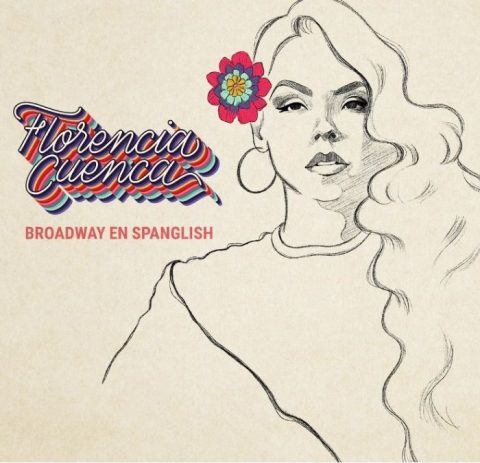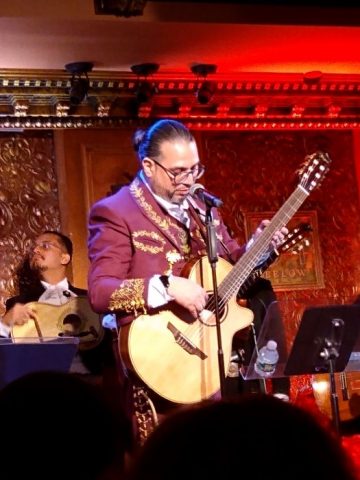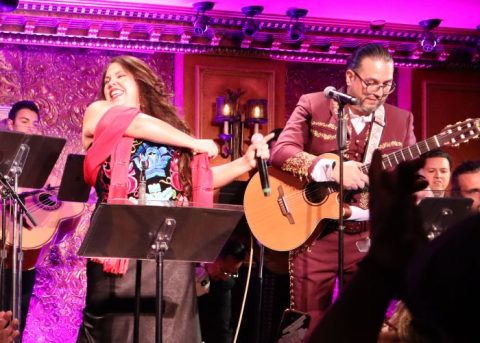
Alza la bandera!
Broadway en Spanglish, the hotly-anticipated new project from Mexican-born musical duo Florencia Cuenca and Jaime Lozano, has finally arrived and it’s now available to stream on all platforms.
 Boasting arrangements by Lozano, vocals by Cuenca and featuring the dynamic Mariachi Real de México, the album, released on the Concord Theatricals Recordings label, proudly puts a unique Latin twist on iconic songs of the Main Stem. Whether injecting Hamilton’s “Burn” with mariachi, or interpreting Wicked’s “The Wizard and I” as a danzón, the pair aim to showcase the universality of a showtune, in an effort to communicate that stories are stories, no matter the language, and we’re all connected through our ability to share them in whatever way we can.
Boasting arrangements by Lozano, vocals by Cuenca and featuring the dynamic Mariachi Real de México, the album, released on the Concord Theatricals Recordings label, proudly puts a unique Latin twist on iconic songs of the Main Stem. Whether injecting Hamilton’s “Burn” with mariachi, or interpreting Wicked’s “The Wizard and I” as a danzón, the pair aim to showcase the universality of a showtune, in an effort to communicate that stories are stories, no matter the language, and we’re all connected through our ability to share them in whatever way we can.
Following a smash-hit, celebratory album release concert earlier this month at Midtown hotspot 54 Below, we spoke to Cuenca and Lozano all about their partnership, Broadway dreams, and—por supuesto—the power of storytelling through song.
Have a look at their answers below, and, if you’re intrigued—start spreading las news—no pierdas tu oportunidad y go check out the album for yourself!!
Can you speak a little bit about your professional history together? What inspired you to perform as a unit?
Jaime Lozano: I mean, we are husband and wife… of course, we have a personal history together (laughs).
Since I met Florencia, she [has] become my muse. I have written a lot of songs that are not only inspired by her, but also dedicated to her, and then even [ones] that she can perform.
Our collaborations started with me as a songwriter and her as a performer, but then evolved into writing songs together, directing each other’s shows, recording together, performing together in concerts… everything under the sun!
I would say, as human beings and artists, we have the same principles, beliefs and motivations. We believe in honest storytelling [and] in being ourselves and creating our own opportunities.
Florencia Cuenca: Before meeting Jaime in person, I already knew about him and his career…. that [he] was this authentic Mexican artist with a very peculiar way of thinking.
But when we met, it was amazing [to discover] how we have the same ideas, the same taste for music and theatre, we like the same things, etc.
It was so crazy to find someone who was so similar to me. And he, too, knew way too much about me as well… it was like we were two minds connected, looking for each other.
We make each other better and we have, and we will continue to, support each other in our projects together.
Can you speak about the genesis of the Broadway en Spanglish project? How did it come about and why?
Cuenca: As a Brown Mexican immigrant artist, it’s been challenging [for me] to navigate the musical theatre and Broadway industry. There haven’t been a lot of opportunities for people like me in the industry, so we have to be creative and create our own.

One day, I was listening to “Burn” from Hamilton and I couldn’t stop thinking about this song being a Mexican ranchera with a very dolida [hurt] wife after learning her husband has been unfaithful to her. I could imagine myself with a shot of tequila in my hand and singing with the mariachi. So, I got home, and I immediately told Jaime—
Lozano: …and of course, because, as I said, I always love and support a Florencia Cuenca idea, I started the arrangement right away. Then, the pandemic came, and we ended up producing the track remotely with all the musicians recording from their homes.
But, when we released the song, [Hamilton creator] Lin-Manuel [Miranda] texted me about how much he loved what we did with it. So, we decided to pick more songs that we love and “twist” them in a similar way. And now… estamos aquí!
What is it about Broadway and the musical theatre genre that speaks to you? In your eyes, why is it the perfect genre for this album?
Cuenca: We are putting our together in this album the two things we love the most: musical theatre and our culture. This is really who we are. This is what we listen to… what we sing at home on a daily basis.
For us, these two things are intrinsically together. We are both things at the same time… literally. And we’re just being ourselves… being honest with what we sing.
Lozano: As immigrants in this country, we are always trying to find ways to connect [back] with México, and music and art definitely help us to do that. On that note, I am sure my music and my stories would be very different if I weren’t now in this country. The fact that I am far away from my original home has shaped everything I am as an artist and everything I do.
But why Broadway? I love storytelling. I love the power of music and lyrics together. And I love musical theatre. A song can change and save a life. A story in a song can change someone else’s story. Isn’t that amazing?
I can understand why people get mad over how, in musical theater, characters randomly break into song. It makes no sense, right?! But I believe [having and hearing] the right song at the right moment is one of our most powerful weapons.
Why, and in what ways, do you think Broadway and musical theatre transcends between English and Spanish so well?
Lozano: Storytelling. We are all storytellers by nature. We love listening to and telling stories. Every country and culture have their own stories and storytellers. We have always learned about each other through stories and sometimes, even in stories told through song.
Musical theatre reflects that – songwriters & musicians are also storytellers. It doesn’t matter where a story takes place… we can all relate in some way, because we’ve all had similar experiences.
Cuenca: And, too, obviously when we have music, like in a song, that’s another layer of storytelling; a subtext, if you will. So, even if we don’t understand the language of the lyrics, we can connect with the music. It goes straight to our heart and our emotions.
Why present the songs in this way?
Lozano: We are going deeper and more specific [in terms of outreach]. Having the songs in these new styles with new arrangements in these new versions [allows it] to reach more people… for more people to connect with [the song]. Also, we may reach an audience who might never listen to these songs because they’re not familiar with Broadway or their [original presentation]. We want our people to connect to the songs we love.

Cuenca: And, as a performer, I myself connect with these songs in a different way [because of] these new arrangements and new Spanglish versions. I feel even closer to the [ideas they’re presenting] on a more personal level. If I connect better with the lyrics and the ideas, that will come through in my performance. Of course, Jaime and I have translated a lot of musicals and songs into Spanish, but this project is different [in that] what we did was mix English and Spanish [into] Spanglish.
Lozano: Again, we live “in between” English and Spanish. We speak both. We are both.
Cuenca: As we speak, believe it or not, we sometimes forget the word in Spanish and other times, we forget the word in English. So, we say the first word that comes to our mind no matter the language (laughs).
What do you look for in translating a song, and also in choosing a song to translate? Do some songs lend themselves to the Spanish translation more than others? How so?
Cuenca: Everything is about connection. Just like I said before, if you connect and relate to the song, it’s easier to find the vocabulary to adapt the story.
Lozano: We chose songs that really mean something to us… that we feel connected to. [The] arrangements and adaptations come from the heart because they tell our story. They’re the soundtrack of our lives.
You’re both accomplished musicians and performers in your own right. Do you find your previous work helps to inform this project, if at all? How so? In what ways is it an extension of your work — or yourselves — as performers and individuals?
Cuenca: In a way, all our projects are connected. We speak about our people and our stories and and who we are. So yes, each project is always [influencing] the next one. And of course, because we self-produce a lot of our work, there is always a learning curve, and always more to be learned. And we build on that to make a better version – a better vision – of the project for the next time.
Lozano: I can never separate who I am as human being and as an artist – those two things are connected forever. I always say that to be a great artist, you need to first be a great human being. And, well... I’m working on it (laughs).
You’ve been performing these songs in concert settings for a while now. Why put them into an album? What inspired that?
Lozano: An album is a way to create a document with this legacy. We love performing live, but being able to preserve these arrangements and Florencia’s beautiful renditions of these songs [to] share with people everywhere is really important for us as artists.
Cuenca: As a singer, it’s a very different experience doing a long recording session versus singing live. But no matter the medium, I consider myself a storyteller and I’m always focusing on delivering the story, so that when someone is listening to the album, or attending our concert, they can relate to these songs.
It’s also, as Jaime said, always nice to have a document to preserve our work. And, yes – a way to connect with even more people around the world.

Is there anything specific about the song choices that lend themselves specifically to this type of reimagining and reinterpretation? How do you know what songs to cover and what to leave out?
Cuenca: It’s not about recording famous songs or beautiful songs. It is about recording songs that are important for us in a deeper level. We have to love what we do. If we record a song, it’s because we love the song, and [it] means something to [us] personally.
Lozano: I write my own songs and my own music, and I perform my own work. I don’t perform others’ work. So, if I’m going to produce cover songs at all, they really need to mean something for me. And the ones on the album are ones that [describe] my journey. They’re songs I really feel close to. And then there’s the process of making them our own — we are not doing “karaoke” versions of these songs. We are going deeper and reinventing them using who we are and our lens of what the songs mean to us. It’s really powerful, and we hope that comes through in the listening [experience].
You recently celebrated your album with a release concert at 54 Below. What is it about that venue that makes it an ideal place to perform? Why should other people go?
Cuenca: We are so grateful for 54 Below and all their staff, because they have been so supportive of our work. For us, it’s not just another venue to perform in. It is a home – our home. As immigrant artists, we are always [on the lookout] for those places that make you feel welcome all the time. They always go the extra mile to make us feel loved and supported.
The album drops during Hispanic Heritage Month, and your preceding concert at 54 Below was part of their month-long Hispanic Heritage Month celebration. What does the month mean to you specifically? Why should it be celebrated?
Lozano: In our country, Hispanic Heritage Month is not a thing. We never celebrated it ‘til we got to America. But any excuse to celebrate is always good (laughs). But seriously, this country has been made by immigrants, many from Latin American or Hispanic countries... people who, like myself, left their countries looking for a better life. They not only fought for opportunities for themselves, but for the [chance] to create a country for everyone, with justice and fair opportunities for all. Hispanic Heritage Month is to honor and celebrate those who have come before us, but also those still in our countries, trying to make a better life for themselves. And yes, it’s a special month to recognize them, but, with our actions, we continue to recognize and honor them every single day.
What does Broadway mean to you? Why should people support it?
Cuenca: I always knew I wanted to be a performer. I grew up watching movie musicals, and I always dreamt about Broadway. It was a very far-off dream, but nonetheless, it was [prevalent] in my mind.
When we arrived in New York and I got to know more about Broadway, I realized not many people on Broadway looked and sounded like me.
I know a lot of people, including us, have been fighting to create those spaces for us. And we will keep fighting ‘til we have more opportunities and representation in this [arena]. We hope we can say one day that Broadway is a place we can all belong.
Lozano: To me, “Broadway” is just a label. Of course, we would love to see our work on “Broadway” someday, but what we do [reaches] beyond that. For us, it’s about the message… and it’s always about the people. We share stories from the people, about the people, by the people, for the people, etc. And that’s what we should support, whether on Broadway or not.

As you’ve said, this project came to fruition, in part, because as Latin artists, you don’t feel like you have many options onstage. What advice would you, or you both, give someone who may be feeling the same way?
Cuenca: Always be yourself. Be honest and [true to] who you are. Create your own opportunities.
Lozano: What makes you different is your superpower. So, embrace it. Find your people. Find your familia, those [people] who will help you, guide you, and support you in your endeavors. And always support and lift others up.
What’s next for Broadway en Spanglish? Where do you see the concept going from here?
Lozano: This album is [presented] primarily in a mariachi style… a very specific Mexican kind of music. We would love to produce a second volume… perhaps with all salsa arrangements.
Cuenca: Aside from eventually producing a second album, we would love to visit the West Coast with this project. We’ve been performing here in many venues in New York City and on the East Coast, [but] we’d love to share this project and who we are with our people on the West Coast…… and then, all over the world!!
Broadway en Spanglish, featuring Florencia Cuenca, Jaime Lozano & Mariachi Real de México, was released on the Concord Theatricals Recordings label on September 27th and is now available on streaming platforms.